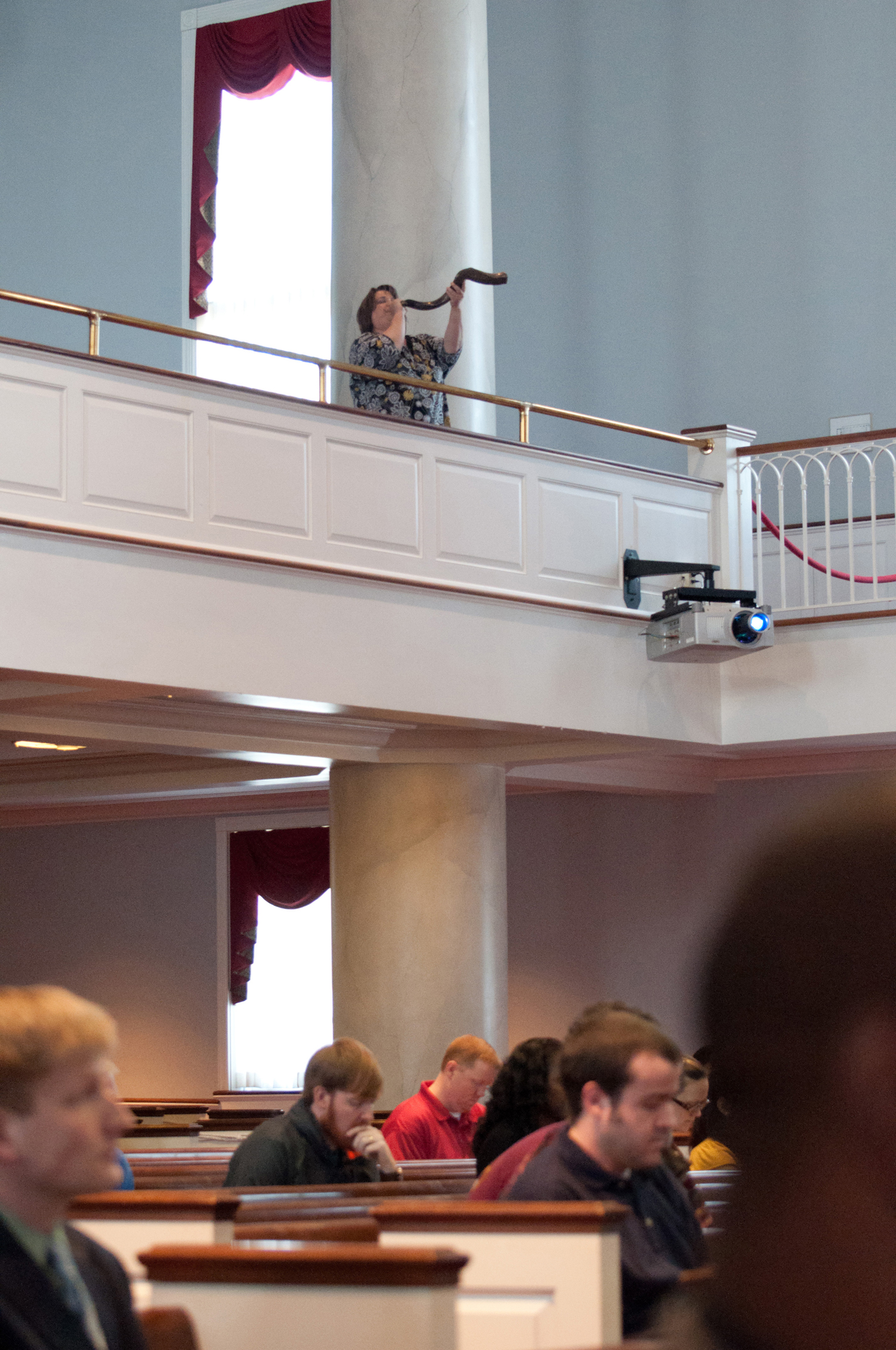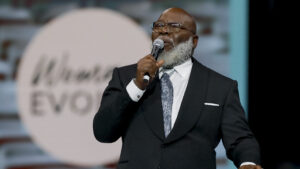
NEW ORLEANS (BP)–With a long, trumpet-like blast from a shofar, the campus revival at New Orleans Baptist Theological Seminary began with a time of repentance and recommitment known in the Bible as a solemn assembly.
NOBTS professor Preston Nix used the call of Isaiah as a guide, setting forth the biblical account in the context of a focus upward, a focus inward and a focus outward.
The focus upward, echoing the prophet Isaiah’s words “I saw the LORD….” in Isaiah 6:1, included music and Scripture readings that acknowledged and praised the character of God.
The focus inward entailed confession of private and corporate sin, echoing the “woe is me” of Isaiah 6:5. Members of the audience were given time for introspection and personal prayer; small groups of three to four people then were encouraged to share commitment needs and struggles, confess the sins which are common among groups of believers and pray that God would bring renewal to the seminary family.
The solemn assembly’s focus then turned outward to the needs of the world, akin to the “here am I, send me” of Isaiah 6:8. Nix exhorted the seminary community to a deeper commitment to sharing the Gospel throughout the city of New Orleans and to the ends of the earth.
The solemn assembly was part of a convention-wide movement to call Southern Baptists to repent and return to God. SBC President Bryant Wright, in an open letter to Southern Baptists last November calling on churches and entities to hold solemn assemblies, expressed his yearning “that in the sight of God and His witnesses we might renew our commitment to Christ and the Great Commission.”
Leading up to the solemn assembly, Nix called on members of the seminary community to prepare to hear from God through fasting and prayer. He specifically encouraged all who were willing and able to fast from noon Feb. 28 until noon March 1 — breaking the fast after the solemn assembly.
Preparation for the assembly began during the first chapel of the semester Jan. 18, with NOBTS President Chuck Kelley preaching on Jesus’ words to the church at Ephesus as recorded in Revelation 2. In a plea for renewed passion for God, Kelley called on the seminary family “to return to their first love.” He announced the date for the solemn assembly and campus revival and urged the seminary community to begin preparations.
Tony Merida, former dean of the chapel at NOBTS, led the March 2-3 revival services that followed the solemn assembly.
Merida, who recently left a pastorate in Mississippi to start a church in North Carolina, focused the New Orleans Seminary community on two stories from Mark’s Gospel.
Merida first spoke from the Mark 5:1-20 story of Jesus delivering a man in the region of the Gerasenes from demon possession. Merida first pointed to the state of the man’s condition.
“Isn’t this a total picture of hopelessness?” Merida said. “It seems as if this guy got gradually worse. Perhaps they could bind him early on, but they could not bind him any longer.”
Merida counseled audience, “We should not distance ourselves too much from this demoniac. Why? Because think about it. Ephesians 4:26-27 says, ‘If you are bitter, unforgiving, angry, you should not let the sun go down on your anger.’ Why? ‘You give no opportunity to the devil.’
That counsel, Merida noted, was spoken to believers. “If you’re angry this morning, if you’re bitter this morning, if you’re unforgiving this morning, you might consider the fact that you’re giving an opportunity to the devil,” he said.
“We all are prone to fall into his evil attacks. So we can say, ‘I’m not just like this man, [but] I am like this man.'”
While no one in the Gerasene region could subdue the demoniac, Jesus did.
“He speaks. [The demons] leave. Period,” Merida said. “This is the power of Jesus on display, and in Mark we have a case where we can say, ‘If Jesus can do this for this man, he can do it for anyone.'”
But then the story comes to the strange detail of Jesus sending the legion of demons into the pigs nearby. Merida urged those present not to miss the economic implications of the death of the pigs.
“I think Jesus wants us to know here that all the wealth in the world does not compare to one human soul,” Merida said.
But the demoniac’s story is not over when Jesus delivers him, Merida continued. The man begs to go with Jesus, but Jesus instead sends him home to his own people to share the news of “how much the Lord has done for you and how He has had mercy on you.”
It’s a story that Merida said every believer can identify with.
“What happens when we meet the Savior? He changes us. He gives us peace. He gives us a new purpose, a new vision. He sends us away [to share the Good News].”
Merida’s second message focused on Mark 8:27-38, which includes Peter’s confession, Jesus’ prediction of his death and Jesus’ command that His followers “take up their cross and follow me.”
The passage essentially answers three questions, Merida noted: Who is Jesus? What did Jesus come to do? What does Jesus call believers to do?
The first question, Merida said, is of utmost concern. “How we respond to this question — Who is Jesus? — will really determine what we do with Jesus. It will determine how we live and how we die,” he said.
And tied to that question of identity, Merida said, is the question of Jesus’ mission as well as His mission for His followers. Jesus makes clear to the disciples three times in Mark’s Gospel — in this passage, in chapter 9 and again in chapter 10 — that He will suffer, die and be raised from the dead, Merida said.
But Jesus’ foretelling of His death and resurrection, though, didn’t sit well with Peter, whom Jesus sternly rebuked in verse 33. Jesus’ mission didn’t line up with Peter’s own vision for Jesus’ ministry, Merida said, and it also has implications for the life of every believer who seeks to follow Jesus, since they too must bear a personal cross (verse 34).
“Jesus basically said, ‘If you’re going to follow Me, and I’m going to the cross, therefore you must [also] go to the cross,'” Merida said. “Everything about us wants to reject or redefine this phrase ‘deny yourselves and take up your cross and follow me.’ Everything in our culture says to love self, pamper self, exalt self. But Jesus says deny self. The cross turns us into Christ exalters, not self exalters.”
Merida concluded his message by calling the seminary family to a new and fresh commitment to “rescuing people, loving people, laying down our lives for the Gospel.”
–30–
Gary D. Myers is director of public relations at New Orleans Baptist Theological Seminary; Frank Michael McCormack is an NOBTS writer.















